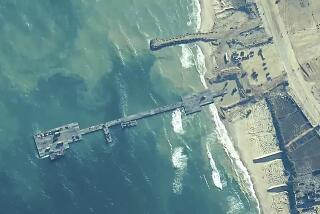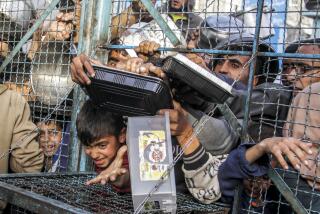HOW GOODS COULD REACH IRAQ DESPITE THE BLOCKADE
- Share via
The U.N. sanctions against Iraq and the multinational armada enforcing them have succeeded in stopping virtually all of Iraq’s exports of oil as well as most imports of bulk items. Smaller cargoes are harder to stop, and a complete halt to smuggling would be impossible. Some countries that are sympathetic to Iraq have already flown in food and medicines, permitted for “humanitarian purposes” under the U.N. resolution. Here are several ways that other smuggled goods could get to Iraq and Iraqi-occupied Kuwait. Illicit transshipment via Jordan: Middlemen can import goods through Aqaba under the false pretense that they are for Jordanian use, and then pass them through to Iraq over a border that Jordan guards only halfheartedly. Over remote borders by truck: The main roads and border crossings are sealed. But the high possible fro smuggling can make it worthwhile for smugglers’ trucks to brave hard-to-police remote tracks through Iran’s Zagros Mountains, across the Syrian desert, or through eastern Turkey. By air over the blockade: Short of shooting it down, there is no way blockaders can keep an airborne cargo jet from reaching its destination. Iraq has its own fleet of 78 large jets and 18 captured Kuwaiti craft that could bring in up to 90,000 tons of goods a month from as far away as Libya. Some flights carrying food may already have reached Iraq from Yemen, Sudan, Libya and Jordan. Up the gulf by dhow: Coastal trading boats called dhows have traditionally carried small amounts of cargo among Persian Gulf ports. They are hard to detect or stop. Dhows could say they are sailing for Iranian ports of Bushehr or Bandar Khomeini, then divert to Iraq or Kuwait once they are beyond the reach of blockading warships.
Sources: Economist; U.S. State Dept.; Associated Press
More to Read
Sign up for Essential California
The most important California stories and recommendations in your inbox every morning.
You may occasionally receive promotional content from the Los Angeles Times.













